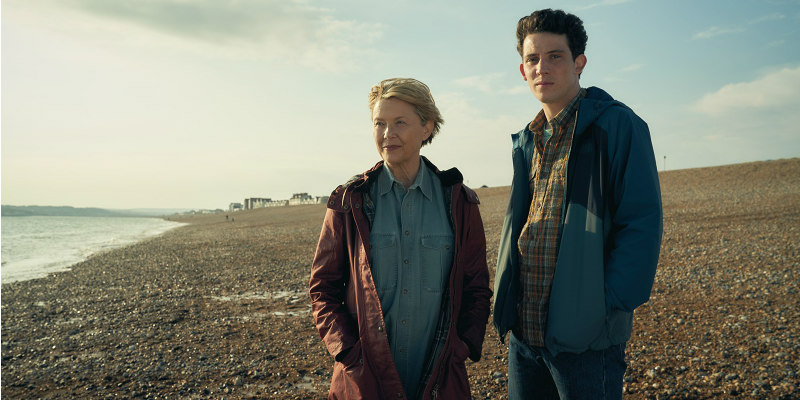Review by
Eric Hillis
Directed by: William Nicholson
Starring: Annette Bening, Bill Nighy, Josh O'Connor, Aiysha
Hart, Ryan McKen, Steven Pacey, Nicholas Burns

"There were three unhappy people, and now there’s only one." That's the cold calculation a woman uses to justify breaking up a three decades old marriage in screenwriter/playwright/novelist turned director William Nicholson's stagey breakup drama, Hope Gap. How you react to the logic of such a statement will largely determine which side of the broken marriage you find yourself allying with.
History teacher Edward (Bill Nighy) and poet Grace (Annette Bening) have been married for over 30 years, and it seems it may have been 29 years too long. Edward has become withdrawn, preferring to spend his time alone in his study, correcting articles on Wikipedia, rather than going out for dinners or attending church with his wife.

In what seems initially like a gesture to placate Grace, Edward invites their twenty-something son Jamie (Josh O'Connor) to spend the weekend with his parents. Grace is delighted to see her baby boy, but once Jamie has retired to his bedroom, an argument breaks out between Grace and Edward. Well, I say argument, but it's really only Grace who is playing any real part in the scuffle, as Edward simply stands there and takes it, like a dog who doesn't know why his owner is hitting him with a rolled up newspaper, but surmises he's done something to deserve the beating.
[ READ MORE: New Release Review - The Woman Who Ran ]
That's the problem, you see. Edward has become so emotionally withdrawn that Grace strikes out physically in an attempt to provoke a reaction, any reaction, from the man she married. But none is forthcoming. "We'll talk about this in the morning," is her husband's frustrating response.

The following morning, while Grace is at Sunday mass, Edward reveals his true motivation for inviting Jamie. He's packed a suitcase and plans to walk out on his marriage as soon as Grace returns, retreating to the arms of the woman he's been secretly engaged in an affair with for the past year, the mother of a troubled student at his school.
[ READ MORE: Re-Release Review - Farewell Amor ]
If there's a reason to see Hope Gap, it's for this specific scene, loaded as it is with tension and pathos. Nighy has found himself a victim of his own unique charisma, typecast in the sort of supporting roles that feel ready-made to be turned into online reaction gifs. Here he's afforded a rare chance to play a proper character, a middle-class Englishman of advanced age who behaves in exactly the way you might expect him to. Nicholson's film has a staginess to it, and I have no doubt it would work better as a theatrical production, particularly if the drama remained confined to the family home and around Edward's reveal of his plans to his son and subsequent execution of said intent to his wife.

Once Edward breaks the news to Grace and leaves, suitcase in hand, the film has nowhere to go, devolving into a flat drama that relies on frankly sexist stereotyping. While Edward is logical, timid and agnostic, Grace is flighty, hysterical and spiritual. Edward quotes historical incidents to justify his decision, like how Napoleon's army would leave behind their wounded rather than risk losing fit and able soldiers. Grace retreats to poetry for an optimism that has no basis in reality, convinced her husband will return, but Nicholson's melodramatic script and Bening's borderline psychotic portrayal makes her difficult to warm to. Edward's actions may be cruel, but it's the cruelty of a vet putting a dog out of its misery. As the child who owned and loved that metaphorical mutt, Grace simply can't see it this way. So broad is the distinction drawn between Edward and Grace's incompatible outlooks that it often feels like the sort of interactions between Spock and McCoy on Star Trek. Grace only falls short of calling her husband a "green blooded bastard."
In the manner of Harry Chapin's 'Cat's in the Cradle', Hope Gap suggests that Jamie, an emotionally stunted young man himself, is set to follow in his father's footsteps, and you can't help but feel there's an autobiographical element to Nicholson's film. Yet Jamie never feels like a real character. He exists not to add anything substantial to the narrative but merely to act as a get out of jail card for a writer who isn't comfortable telling stories in a visual medium. Jamie's sole purpose is to provide a sounding board for his parents, as Nicholson repeatedly tells rather than shows us what Grace and Edward are thinking and feeling. We're left to simply take Edward and Grace's conflicting accounts at face value, denied the sort of flashback structure that might have elevated Hope Gap to the heights of Stanley Donen's Two for the Road or Derek Cianfrance's Blue Valentine. To deliberate on Hope Gap's post-marital trial, this jury needs more substantial evidence.

Hope Gap is on Netflix UK now.


